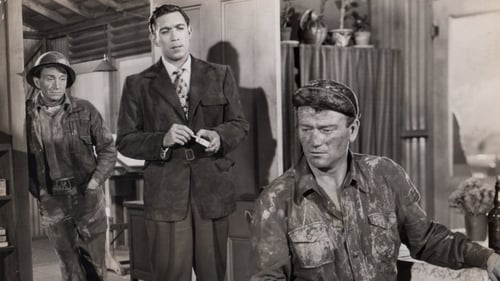Magtanggol (2016)
ジャンル : スリラー, ドラマ
上映時間 : 2時間 23分
演出 : Sigfreid Barros-Sanchez
脚本 : Henrie Famorcan Enaje, Henry dela Cruz Jr., Sigfreid Barros-Sanchez
シノプシス
A political family tries to hold on to their integrity and reputation as they face a difficult crisis.

Ian Montes is a picture of success. Despite being a son of a shipping tycoon, Ian refused to just ride in his father's empire. He built his own real estate company and earned his first million at a very young age. He never looked back since then. Driven by his ambition to become better, if not as good as his father, Ian managed to make it on his own. But behind all the glory is a man yearning for love and recognition.

An Army colonel leads a guerrilla campaign against the Japanese in the Philippines.

Evo and Grace are from different worlds. Their paths cross serendipitously when Grace, a waitress in a girlie bar, agrees to fill in for a stripper friend on a bachelor party attended by Evo. His not-so gentlemanly behavior during the party doesn’t endear him with Grace, and unfortunately, neither with his girlfriend who instantly breaks-up with him. Wanting his girlfriend back, Evo arrives at a scheme upon discovering that Grace happens to be his bestfriend’s girlfriend.

The story about a teenage boy, Antonio, whose emerging gay sexuality alienates him from his friends and family, until his libertine uncle, Jonbert, comes to live with him and his mother...

Inspired by a true news account, this is the astounding story of a lone deranged hijacker who has struggled to survive in the chaos of modern Philippine society.

A bus takes-off from urban Manila to the rural southeastern side of the country, carrying a group of mixed passengers from all walks of life, each one has a personal story to tell and they are telling it in their own voice. During the long journey, as the passengers mentally sort out their past & their future, things happen in the present, by choice or by providence, that make their journey memorable—the bus blows a tire, a song elicits tears, a butterfly causes commotion, a picture gets lost, someone's head is stoned, some hearts are broken, some mended. The bus ride poetizes the life journey and poses questions on issues of life and death and where exactly the line is drawn between free will and destiny.

Mateo is a lighthouse caretaker dating a teacher Suzette. The small town they are in is trying to increase tourism. Jerome stumbles across Mateo and Suzette having sex, whilst he is on holiday from Manila. A local a gay man, who pays local teenage boys for sex, talks to Mateo about the negative aspects of being gay in the Philippines. According to local legend, a lighthouse fairy seduces desirable men who then never marry. Mateo's relationship with Jerome leads to self reevaluation

The Mommy Returns tells the story of a mother, Ruby, who dies right on the day of her 25th wedding anniversary with husband, William. With her untimely death, she leaves behind her three children Amethyst, Topaz, and Sapphire. Ruby is also temporarily trapped in PURGA (short for Purgatory) with its guardian, and the pesky Manny, the chicken pet of San Pedro. When Catherine, a younger and prettier woman comes into the life of William, Ruby escapes from PURGA and returns to earth as a ghost to drive Catherine out of the family she left behind.

Crucible of Empire demonstrates how and why the Spanish-American War constitutes such an important milestone in U.S. history. This program examines the events and attitudes that led to war, followed by an exploration of the conflict and its outcome. Early film footage and stills of battle scenes, plus rich visuals, a compelling story, and intriguing analogies to current foreign policy make Crucible of Empire a riveting documentary.

The title “Kamera Obskura” is a Filipino spelling of the latin “Camera Obscura” which simply means “dark room”. The film’s concept adheres to formalist cinema, where the filmmaker’s thesis is to make a semblance of a vintage film seemingly produced sometime in the late 1920s to early 1930s in the Philippines. The thesis is to conjure up a film from a period that did not really exist in Philippine cinema’s historical cultural heritage as we know it, such as a pseudo-expressionist / experimental Filipino cinema of the silent film era. It is a film within a film. The narrative plays with the idea of a retro-futurist world where a prisoner locked away in a dark chamber for over two decades only sees the reality of the world outside through the small hole in his cell, which projects an image of the city on his wall, the phenomenon of the “camera obscura”.

Every night, Nana Lusing lies on her bed sleepless because she sees a dark figure looming in her room. Who is this shadow? Is this the devil? Her late husband? A manifestation of her anxieties? Or simply a figment of her imagination?

Intoy has had the hots for Doray since they were kids in Kalye Marino, Cavite City, formerly the American Naval Base in Sangley Point. Both marginalized as the long-lasting effect of American abandonment of the said base, Intoy has become Kalye Marino’s best “tahong” caretaker-with-no-angst-about-poverty, while Doray a cheap prostitute-with-no-guilt, tending to her siblings’ needs. Intoy strives to have his own cages of “tahong” so he can have Doray, not for just a night of quickie sex, but forever. But what will he do to when she offers to drop by his hovel-on-stilts to quench his passion, but before it happens Nature has chosen to play a joke on his tahong cage? Will it be goodbye to his tahong business or to his damsel-in-distress and ultimately to Kalye Marino? From Eros S. Atalia’s 2001 Palanca Grand Prize-winning Short Story, Intoy Syokoy ng Kalye Marino is a love tale minus the obligatory romantic sentiments.

Guam, U.S.A. Thursday, November 24, Thanksgiving Day. Alex, a local newspaper photographer, gets into a “green card marriage” with her good friend James, a Guam-born Filipino. Miriam, a former member of the Philippine press and now an established Guam journalist, longs to repair a damaged relationship with her American husband. Ella, a hotel housekeeper for almost 20 years, finds means of sending her 88-year old mother to the Philippines with the uncertainty of coming back. As the island of Guam celebrates this classic American holiday when people count their blessings and give thanks, the lives of the three Filipina immigrants intersect and find themselves at a tug-o-war of sacrifice and significance where they must find their home or must they find it somewhere else.

Circus hijinks surround the barangay of Sta. Maria in the midst of an international murder sensation. Swanie, Sta. Maria’s barangay chair and a distant relative of the killer, tries to gain political points by staging a wake for the criminal-turned-celebrity. Meanwhile in faraway Manila, Joanna, Swanie’s runaway son, navigates his way through labyrinthine bureaucracy, to give a neighbor a proper burial. With these two unrelated deaths, estranged mother and son each bury the dead long shelved in their hearts. Amidst these unspoken family burials, the neighborhoods’ penchant for funeral fiestas, gossip and secrets, bizarre social events and the sheer mix of scandal and inebriation complete the picture of dying the Pinoy way.

On a particularly nondescript weekend afternoon, Edison must deal with his exasperated mother, who is bearing down on him like a force of nature; the looming deadline of a paper on the philosophical writings of Immanuel Kant; and a persistent, insidious force that aims to destroy the tranquility of his existence.

Boses (Voices) is the story of a musician named Ariel who offers violin lessons to a child of the slums. Through the violin, the abused child Onyok is able to get back his voice from a mute, desensitized existence. A violin teacher and his student, a mute 7-year old abused child in a shelter, develop a friendship stemming from their love of music. Ariel discovers the immense talent of Onyok hiding behind a veneer of silence and pain caused by an unhappy and cruel father. In the developing relationship of teacher and student, both characters reveal more of themselves that otherwise may have remained unspoken. They discover each other's strengths and failures through the violin lessons.

Due to a delayed flight a group of German flight passengers have to wait in the hall of the airport of Manila. The crowd is quite mixed, ranging from an cultivated east German teacher couple up to sleazy sex tourists. As the waiting prolongs, more and more aggressions and long repressed behaviors shed their way to the surface.

It's the story of a young woman, whose husband, is arrested by the soldiers of a Japanese garrison, on the suspicion that he is a guerilla. Dizon pleads her case to the garrison's commander, who sympathizes and lets Yllana go; when the commander's wife dies and leaves their son motherless, Dizon, is hired to feed the baby from her own breast.

A lowly farmer whose wife is afflicted with a lingering illness gets involved in kidnapping that goes awry and culminates in tragedy. Years later, he turns to a crusading lady journalist to confess the details of the sensational crime that remains unsolved.

Sam (Yul Servo), a former soldier unintentionally gets disturb in a robbery gone wrong. Escaping with the bag of stolen loot, he hides inside an abandoned mansion where he meets the mysterious young woman Latia (Julia Clarete), bathing nude inside the homes filthy pool. They begin a passionate and blazing affair even as the crime kingpin Johnny B (Dido dela Paz) and his armed men launch a desperate search for the money.


















